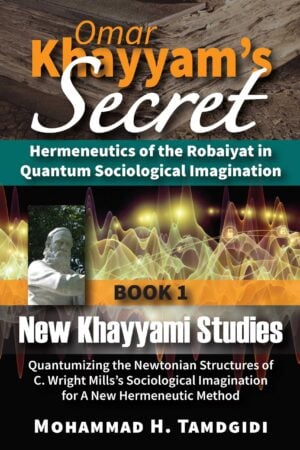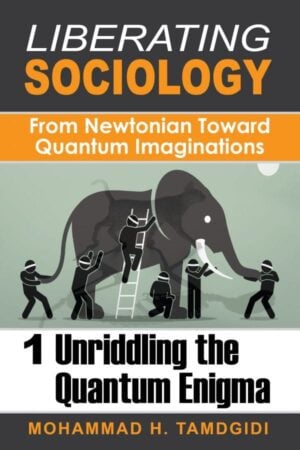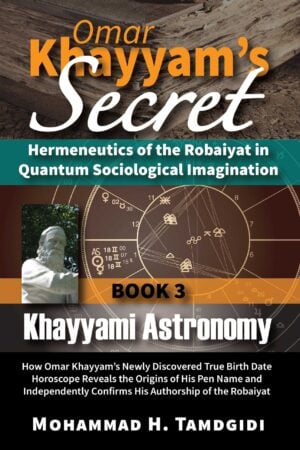Book Section: CHAPTER III — Hermeneutic Analysis of Clauses 20-50 of Omar Khayyam’s Treatise on the Science of the Universals of Existence: Ascending the Succession Order — by Mohammad H. Tamdgidi
$20.00
This essay, titled “Hermeneutic Analysis of the Clauses 20-50 of Omar Khayyam’s Treatise on the Science of the Universals of Existence” is the third chapter of the book Khayyami Philosophy: The Ontological Structures of the Robaiyat in Omar Khayyam’s Last Written Keepsake Treatise on the Science of the Universals of Existence, which is the fourth volume of the twelve-book series Omar Khayyam’s Secret: Hermeneutics of the Robaiyat in Quantum Sociological Imagination, authored by Mohammad H. Tamdgidi.
Description
Abstract
This essay, titled “Hermeneutic Analysis of the Clauses 20-50 of Omar Khayyam’s Treatise on the Science of the Universals of Existence” is the third chapter of the book Khayyami Philosophy: The Ontological Structures of the Robaiyat in Omar Khayyam’s Last Written Keepsake Treatise on the Science of the Universals of Existence, which is the fourth volume of the twelve-book series Omar Khayyam’s Secret: Hermeneutics of the Robaiyat in Quantum Sociological Imagination, authored by Mohammad H. Tamdgidi.
Following the first part of his treatise where Khayyam suggested that humankind does not become human unless it becomes conscious of its place in the “succession order” of the created world’s existence, Khayyam is basically offering in the clauses 20-50 of his treatise such information that would be necessary for guiding humankind in the path of such awakening and in search of God’s knowledge. In other words, Khayyam regards the epistemological challenges facing humankind in the path of such awakening and spiritual search itself to be a part of his ontology of existence, without which the story of existence and why it was created would be incomplete. All the various clauses 20-50 of the treatise, therefore, shed light on the difficulties or challenges facing human self-awakening as a requirement in its search for the knowledge of God to understand the origins, nature, and purpose of its existence.
So, the topics discussed in this second part of the treatise can be regarded as having been selected by Khayyam as the most important universal issues that are necessary for humankind’s effort to know itself and its place in the succession order of created world’s existence. To summarize, Tamdgidi briefly lists the topics again before closing this chapter.
1. Khayyam discusses how the intellect, the self (soul), and body interrelate, and should interrelate, in the human effort in gaining universal self-knowledge. Khayyam clearly considers the intellect to be the noblest and the self being nobler than the body. The self plays a mediating role in terms of the emotional place it occupies in the interaction of the intellect and the body in the human search for its creation source. But, neither of the three can be ignored, since inevitably they can play contributing or fettering roles in the process. This topic, as we shall see when we interpret the treatise as a whole, would be very important in shaping the ontological structures of any poetry Khayyam may have written.
2. Khayyam suggests that offering the universals of any knowledge to be gained or passed on is sufficient for the purpose he has in mind. In his view, the details are transient, but the universals lasting, and goes so far as suggesting that knowing the universals can necessarily lead to the knowledge of the details. This is also important for our purpose here, since it suggests Khayyam was confident that by providing his view of the universals of existence, he was providing sufficient information so that important details of his own knowledge could be passed on through his treatise.
3. Khayyam devotes considerable space to elaborating on the logical categories of essentials and accidentals. Although their discussion in the treatise may appear “secondary” and “accidental,” however, given the significance he attributes to matters of logic in distinguishing his own perspective from those of philosophers in particular, close attention should be paid to why and how he presents them and how he applies them in the exposition of his treatise itself.
4. Evidently astrological matters also come into play in Khayyam’s discussion of epistemological issues he addresses as part of his ontology of existence. The language he uses and the references he makes to the motions and fixations of spheres in relation to human behavior and inclinations invites further consideration. However, Khayyam interestingly suggests that further details of the role played by such influences in human life can best be understood by those who seek such knowledge in their own lives.
5. Khayyam also discusses rhetorical styles of speech, and clearly offers us a hint that language takes on different forms and modalities depending on the social and communicative situations an author may find himself in. He identifies the various forms and in particular suggests how one can offer statements that appears to say something, but has a different meaning, or statements can be offered that share multiple meanings at once. These forms clearly imply attention to the poetic forms of expression.
6. Khayyam also picks up on the topic of human nature, and by clearly distinguishing between short-term or longer-term inclinations and fixations that may arise in human life, its behavior may take on pleasant or unpleasant forms. However, he clearly notes that one has to distinguish between such accidental manifestations in human nature and the essence of humankind being spirit and coming from a noble source in the succession order.
7. While presenting the distinction between necessary, possible, and impossible existence, Khayyam offers an anthropic argument for the existence of God, which leaves no doubt in his view of the existence of God, a Necessary Being, as a creator of the world as a possible existence.
8. Khayyam then also offers an odd discussion about properties of bodies (partly incomplete due to loss of passages), whose significance can be considered in terms not of bodies alone but how their properties can be understood more or less habitually by the self-reflecting intellect. The central point of this discussion has to do, again, with matters of habit, where what otherwise can be dazzling and strange, such as properties of fire and magnet, can become over time so overfamiliarized in the human mind that the strangeness may not be noticed. Through this and prior clauses, Khayyam offers a continuing emphasis on the need to consider the knowing subject to be a part of the object to be known. So, knowing the properties of objects inherently implicates the knowing subject in the knowing process.
9. Khayyam ends his treatise with what can be regarded as a discussion of heaven, but without addressing it as often habitually considered in terms of an afterlife. Regarding seeking the knowledge and experiencing the presence of God, which can be considered his way of approaching heaven, he distinguishes the four ways of theologians, philosophers, Ismailis, and Sufis, seemingly recognizing the contributions of each to its predecessor in the order in which he presents them, while also addressing their limitations. The reliance on literal and traditional interpretation of sources by theologians are contrasted by the logical approach of the philosophers who themselves are found to have failed in their own logical practices and one-sided reliance on intellect alone in search for the knowledge of God. The Ismailis are acknowledged for having emphasized that the right knowledge can arise in a just and honest person, implying more than intellective skills, but the Ismailis’ dependence on a leader to provide such knowledge is seemingly problematized. The Sufi way is found to be the best of all four paths, though implicitly, in Khayyam’s own elaboration it seems he was also inclined to believe that any seeker, regardless of any sect or leader dependence, can achieve the knowledge of God, since in Khayyam’s view such knowledge is not barred from humankind, but its lack is due to the impurities in humankind’s own inner life. Once such self-purification is achieved, Khayyam argues, the truth of existence can be learned without any doubts or confusions. He thus portrays himself (in his senior years) as one who has found his answers.
10. Khayyam ends with a clause (omitted from recent renditions of the manuscript), on the topic of hell. Again, instead of offering a common narrative of it in terms of an afterlife place associated with a day of judgment, Khayyam basically reports ancient beliefs of Egyptian and Greek thinkers about hell being a lack of achievement of knowledge by humankind in search of God in this world, of not completing the spiritual tasks of intellective self-reflection, leading to the recycling of the elements comprising his or her body into other human, animal, plant, or solid forms, until successful efforts are made at the completion of the spiritual journey. So this implies that the “succession order” of existence is by no means automatic, and it depends on the extent to which the human organism makes the necessary effort during its lifetime to complete the task of its spiritual fulfillment.
Recommended Citation
Tamdgidi, Mohammad H. 2021. “CHAPTER III — Hermeneutic Analysis of Clauses 20-50 of Omar Khayyam’s Treatise on the Science of the Universals of Existence: Ascending the Succession Order.” Pp. 121-178 in Omar Khayyam’s Secret: Hermeneutics of the Robaiyat in Quantum Sociological Imagination: Book 4: Khayyami Philosophy: The Ontological Structures of the Robaiyat in Omar Khayyam’s Last Written Keepsake Treatise on the Science of the Universals of Existence. (Human Architecture: Journal of the Sociology of Self-Knowledge: Vol. XVII, 2021. Tayyebeh Series in East-West Research and Translation.) Belmont, MA: Okcir Press.
Where to Purchase Complete Book: The various editions of the volume of which this Book Section is a part can be ordered from the Okcir Store and all major online bookstores worldwide (such as Amazon, Barnes&Noble, Google Play, and others).
Read the Above Publication Online
To read the above publication online, you need to be logged in as an OKCIR Library member with a valid access. In that case just click on the large PDF icon below to access the publication. Make sure you refresh your browser page after logging in.







